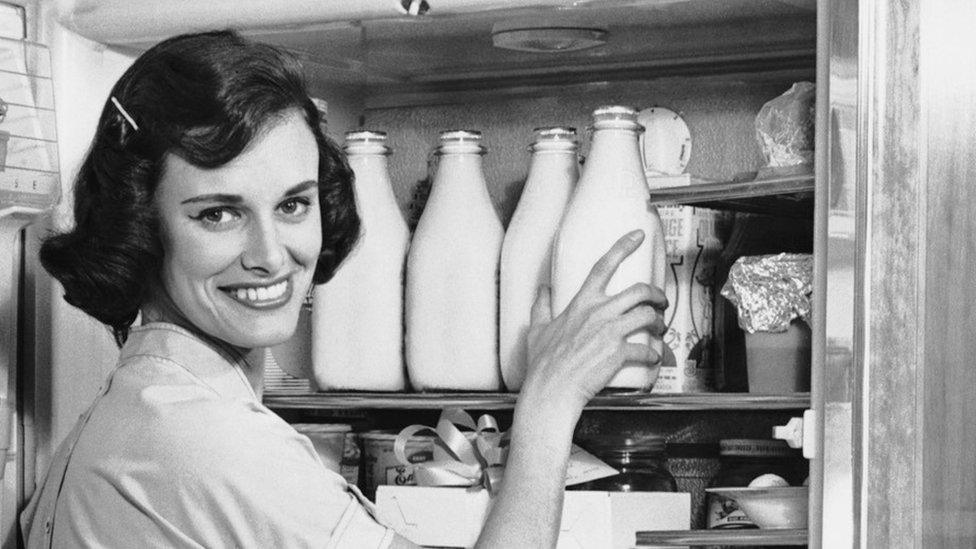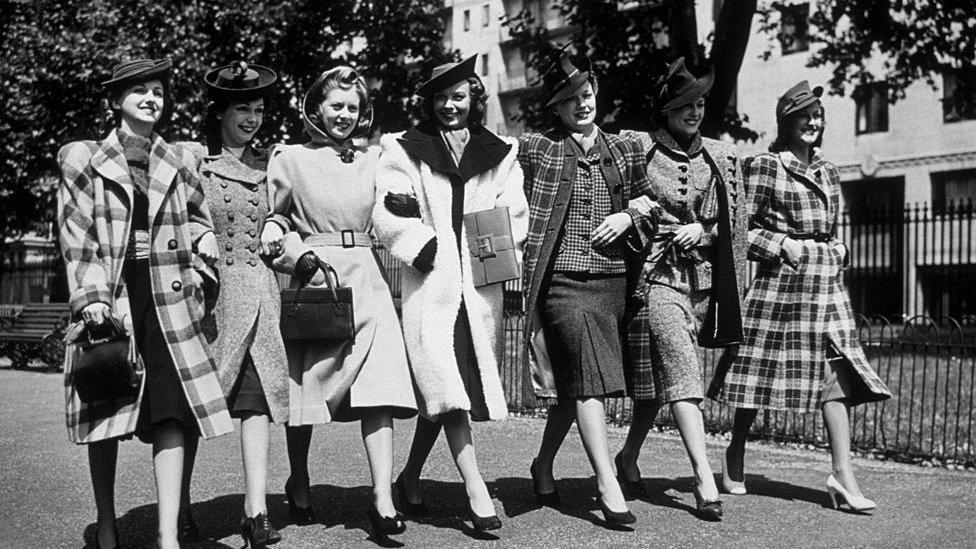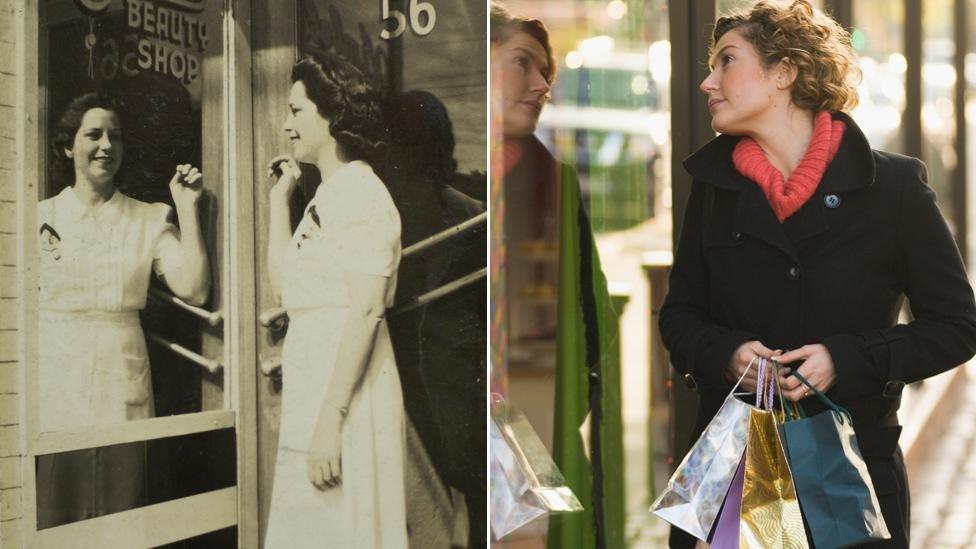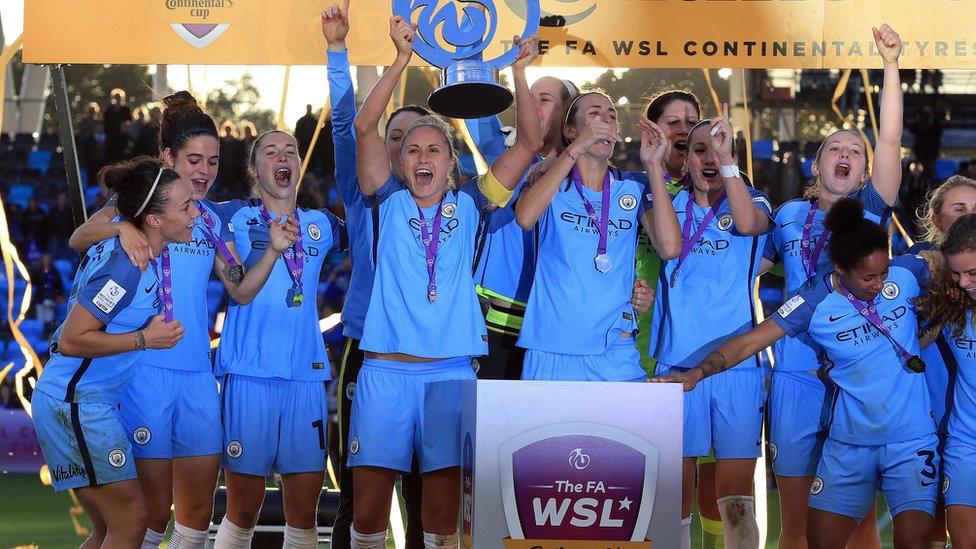Woman's Hour at 70: 'Hooray for being a housewife'
- Published

On 7 October 1946 a male presenter introduced the very first episode of Woman's Hour.
Created as a time-filler for housewives, its early broadcasts were criticised for being "patronising" and obsessed with the routine of domestic chores.
Three months after the programme's launch, the first female presenter was at the helm and the show went on to become a Radio 4 staple - the longest-running radio magazine programme in British broadcasting.
From how to cook with whale meat to contraception and "the perfect affair", the shifting nature of its subjects shines a light on the changing nature of the issues affecting women.

The 1940s: 'Putting your best face forward'

"Good afternoon and welcome to our first Woman's Hour... it's your programme, designed for you," were the first words of the first Woman's Hour.
Life at the end of World War Two was bleak and women were responsible for helping restore the nation's morale.
Focusing on the housewife, early episodes were about rebuilding the home.
Topics such as "mother's midday meal" - herrings, kippers or a baked potato - and "putting your best face forward", wearing lipstick, powder and a headscarf, were the norm.
Norman Collins, who commissioned the programme, said: "I always visualised the poor, wretched housewife, her morale probably at the lowest, at around two o'clock in the afternoon, when she had the washing up and lunch to do."
One of the advantages of radio was that during the programme, women could complete their chores at the same time as listening.
Other programmes for this decade also emphasised women's place in the home, with titles including Giving the Wife a Hand and What Not to Wear.
Guests included Elisabeth Lutyens, pioneering woman composer, and performer Dame Edith Evans.
Groundbreaking moment: When the word "vagina" was used in 1946, in an item about women's health, there was uproar and for decades the term "birth canal" was used instead.

The 1950s: Taking up a part-time job
Husbands and children speak to Woman's Hour about how they feel about their wives and mothers going to work
During a decade of firsts many women began thinking about taking up a part-time job, but would their husbands help out?
A builder's handyman, on Woman's Hour on 22 June 1958, described his family's daily routine and juggling housework with his wife's part-time job office cleaning.
He said: "I don't think I'd stop my wife going out to work at all; she likes going to work and she's happy doing the work. While that runs that way I don't think I'd ever try and stop her."
Without his wife's income, he said, the family would have to go without a few luxuries such as the TV and his cigarettes.
Helping out around the house was "quite a simple job for any man to do" - he cleaned the windows, did repairs and even turned his hand to sewing when he had to, because his wife didn't like it.
His wife woke up at half past five in the morning, leaving him to get their daughter ready for school.
The handyman described his daughter as "very handy" in helping to cope when his wife wasn't there.
Other episodes in the 1950s touched on equal pay but titles like Hooray for Being a Housewife still existed.
Guests included singer Vera Lynn and Nancy Astor, the first woman to take her seat in the House of Commons.
Groundbreaking moment: Breast cancer was discussed for the first time, with a personal story about an operation in 1954.

The 1960s: The Abortion Act
Woman's Hour discusses the Abortion Act 1967
In 1967 the Abortion Act was passed, changing the lives of many women - and the doctors who carried out the terminations.
One doctor, who appeared on Woman's Hour on 19 June 1969, said: "You have to be honest with yourself that you're doing right. I must admit that once or twice these decisions have brought me near tears."
In 1966 three girls had an abortion at her surgery, but the first four days of 1967 had seen four girls turn up to have a termination, and since then three more had arrived.
It's the "in between cases that are so worrying" for those in the medical profession, as there are so many factors to consider when signing off on a termination, she said.
"It's a decision which means ending the life of an unborn baby and I sometimes wonder if we're preventing a genius - a Michelangelo or a Leonardo da Vinci - being born."
Doctors were faced with a "girl wracked with tears and a quaking boyfriend" on a daily basis, and if couples decide to have sex they should take steps to "prevent a pregnancy or face the music".
Other programmes from this decade delved into issues of contraception and the sexual revolution.

The 1970s: A 'courageous' interviewee
In the 1970s, Woman's Hour spoke to a man, who was born a woman, about being transgender
"I wonder if you can imagine what it's like to be born into the wrong body," a guest asked Woman's Hour on 18 September 1974.
Starting life as a female, but never being happy in that gender, the "courageous" interviewee sought help and advice from doctors, psychiatrists and priests.
Reprimanded for "walking like a man", despite not knowing any different, he said: "I felt completely wrong."
After a five-month stay in a psychiatric hospital, the psychiatrist's parting words were: "Goodbye my dear - enjoy being a woman."
He later joined one of the services, but said "it was a struggle... obviously my medical records were against me" and after two years he was medically discharged.
Various psychological tests later, it was decided he was a homosexual.
"I was very unhappy with that label," he said, suggesting that nobody really understood his situation.
Other episodes during the decade looked at women's hopes, fears and aspirations, and the decline of the institution of marriage.
Guests included then Prime Minister Margaret Thatcher, and Shirley Chisholm, the first African-American woman elected to the US Congress.
Groundbreaking moment: Stephen Bonarjee, in charge of radio current affairs, suggested Woman's Hour needed more women with direct experience of motherhood on its staff.

The 1980s: The Miners' Wives
Miners’ wives talk about their experiences of the 1984-85 strikes
"The women have come to the front and they are determined they're not going to be pushed back into the kitchen sink any more," a 1988 programme was told.
Miners' wives had been made politically active by the 1984-85 miners' strike and ensured their families were fed and supported, despite the uncertainty of their husbands' jobs.
Women were "realising the potential they've got", said Eileen Wilkinson, who formed the Thornhill Women's Support Group.
Mrs Wilkinson said she didn't think things "would ever return back to normal" and it had shocked men that the women "were brainier than they thought they were".
Women would not be content to leave this independence behind, with talks of charity work and support for the Labour movement.
Husbands had come to accept what their wives were doing, she said, as "there's no way" they could be stopped and many women felt it was now "their turn".
Other programmes also reflected a new-found confidence in getting involved in matters outside the home, with one episode called My Mind Said I Could Do It.
Guests included US talk show host Oprah Winfrey and Winnie Mandela, then wife of South African anti-apartheid leader Nelson Mandela.
Groundbreaking moment: The first Man's Hour was broadcast on 1 April 1986, with segments on redefining masculinity and knowledge of women's functions.

The 1990s: Monica Lewinsky
Monica Lewinsky talks candidly about her affair with President Bill Clinton.
"I did not have sexual relations with that woman," US President Bill Clinton infamously told reporters in 1998.
Monica Lewinsky, a young intern and the woman in question, told Woman's Hour her version of events the following year.
"He loses the smile, the eyes become intense, there's an animalistic stare, you feel like he's undressing you with his eyes and it's powerful," she said of their early meetings.
Claims that she was "shameless", or somehow to blame for an affair that led to the president being impeached, were not something she accepted.
"I come from a generation of women that need to be more comfortable with our sexuality... I don't think I'm a 'hussy'," she said.
Neither did she accept she should not have been in another relationship at the time.
"It's interesting from a woman's perspective how I'm questioned about this, yet the president was already involved in at least one other relationship - with his wife."
One regret, she said, was for the Clintons' daughter Chelsea and "how painful this has been for her".
Other programmes in the 1990s reflected a change in women's attitudes and a shift towards taking control.
Guests included Stella Rimington, the first woman to head MI5, and the UK's first astronaut Helen Sharman.

The 2000s: Having it all
Nigella Lawson was also invited on to the programme to talk about cooking for Christmas
"It's seen that you must be perfect at everything, you must be wonderful," Nigella Lawson told Woman's Hour in 12 October 2000.
Her book How to Be a Domestic Goddess, published that year, was accused of romanticising a previous era when women were stuck in the kitchen.
That, she said, was a "misunderstanding", as people presumed she was writing about the "joys of housework and how domestic life is the only true and proper way for a woman to achieve anything worthwhile".
Instead, she was arguing for choice, and the idea that women were "allowed to do a bit of everything".
"If I bake a cupcake, how many points does it knock off my IQ?" she asked.
Ms Lawson said baking was "comfort cooking" and that it made you feel good about yourself.
Empowerment and life choices were themes throughout the programme in the noughties.
Guests included Jane Juska, author of A Round Heeled Woman, and Harry Potter creator JK Rowling.
Groundbreaking moment: Edwina Currie gave her reaction to John Major's "shame" over their four-year affair and explained why she decided to reveal the infidelity.

The 2010s: a perfect affair?
Is it is acceptable to have an affair or morally reprehensible?
"The marriage is destroyed, or at the very least rocked, but can an affair save a failing marriage," Woman's Hour listeners were asked at the start of an episode on 26 March 2010.
After a slew of celebrity infidelities, affairs were a recurring theme and their impact on ordinary relationships something to consider.
Sarah and Peter, a couple who have been married for 13 years, talked to the programme about moving on from infidelity after Sarah met a man on a dating website.
"I was just looking for something to hit the refresh button," she said.
Sarah lied about attending pilates classes to carry out the affair every Wednesday night.
After being discovered, she felt guilty, but when the couple spoke about it they realised it brought them back together.
The pair agreed that marriage was a "deeper love than just who you've slept with".
"It was improving my situation at home, I was happier, I was more relaxed, less stressed.
"The children were happier, Pete was happier. So I didn't feel guilty about it because it was actually giving something to the relationship."
Other episodes in the 2010s nodded towards high-power roles for women and a nonchalance towards discussing taboo subjects.
Guests included Anne Darwin, wife of canoe conman John Darwin, who faked his own death at sea in 2002 in a bid to claim a life insurance payout.
Groundbreaking moment: The 2015 Woman's Hour Power List included transgender activist Caitlyn Jenner.
Woman's Hour celebrates its 70th birthday on Monday 10 October with a special programme in front of a live audience, from 10:00 BST on BBC Radio 4, or listen again via the website.
- Published10 October 2016

- Published6 December 2011
- Published5 October 2016
